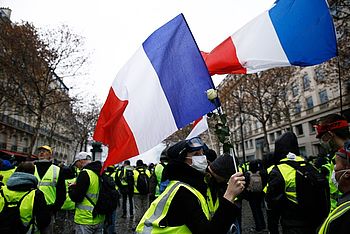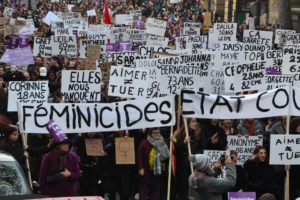Analysis from our member organisation “Espaces Marx” on the shaken political landscape in France prior to the European Elections.
The current balances of forces in France is worrying
The left as a whole is credited around a third of the possible votes for the European elections. Such a low overall expected result demonstrates its historical weakness. The left is divided in different lists that all aim at running independently. The Greens (6-8%), the PCF (1-2%), Génération.s (2-4%), the Socialiste Party (4-6%) and the France Insoumise (8-11%).
On the one hand you have the traditional component of the social democracy (Socialist Party and Generation.s) to which you can add the Greens. The latter does propose a specific stance, acknowledging their priorities : federalism and ecology but they do not differ radically in their political perspective or policies. The social-democracy remains convinced that the modification of the actual European treaties is not central to aim for a political change in Europe however they can argue that certain dispositions of the treaties could be refurbished.
On the other hand, the France Insoumise puts at the core of its program negotiating the actual treaties, precondition to the political change they call for. Their political stance is the most eurosceptic one on the left side of the political spectrum in France however they do recognise the European scale as a necessary realm of action. We could sum up their position as the following « We are not against Europe, we are against the European Commission ».
Between both poles, the PCF is refusing to chose between changing the treaties and acting inside of the actual framework of the treaties. The party believes that there are possibilities in both scenarios and that it can propose policies to act on both fronts.
Adding to the division, we would argue that the different formations are inaudible. Most of the forces have yet to announce the composition of their list and program. Moreover, if some of the political topics traditionally associated to the left (social justice, minimum wage rise, consumer purchasing power, rise of the level of low pensions…) have been occupying the political debate in France – particularly since the rise of the Yellow Vest movement- the left does not seem to benefit from such a phenomenon.
The far right is credited of 29% of vote intentions (Rassemblement National and « Debout la France ») in the polls and its influence on the political debate is usually easy to identify specifically on migration, security and terrorism. The actual Yellow Vest movement has imposed a new narrative oscillating between an anti-taxation stance and a social demand for social justice (rise of minimum wage, rise of high-revenu taxation, …). This movement benefits from a large social basis (from the radical left to the far right). It is therefore hard to define but its political claims have for the moment occupy a central position putting temporarily on hold some of the main political claims of the far right in the political debate. It does so without however decreasing the potential of far rights forces. On the contrary some argues that it could help a posteriori the Rassemblement National, however it now opposes openly some of the political demands of the movement (rise of the minimum wage).
The centrist forces that constitutes the « liberal forces bloc » (Modem, La République En Marche, UDI) supporting Macron are averaging a 25% of the vote intentions. 22% if UDI runs alone (credited of 3%). It is a relative low score in toto comparatively to the 28% of the first polls of last year. However, they will benefit of the massive mobilisation of high educated and high revenus voters. They indeed traditionally are less abstaining that the average on European elections.
The traditional conservative (Les Républicains) forces are stagnating between 10-12% incapable of recovering from the defeat at the presidential elections.
Politics of the Yellow Vest Movement
The eruption of the actual social movement taking place in France has overcame the traditional course of the political debate. As a consequence of the on going Yellow Vest movement the political debate has focused on three main questions : a demand for higher buying power / democratic demands that aim at reforming the institutional political structure / the authoritarian trend of the government.
The left has taken such an opportunity to put forward its proposals for social justice and institutional change (6th republic for the France Insoumise, introduction of a proportional system,…). It does not seem to particularly benefit from this movement that unexpectedly anchored as central the question of social inequalities.
The conservatives are adopting an anti-taxation stance hoping that they can convince popular classes that decreasing the numbers of taxes will offer them a higher buying power. It does not seem to benefit either from the movement. Indeed, if the level of taxation has been put into question it is firstly as it is seen as unjust. Indeed, the government started its mandate by decreasing taxation on great fortunes. The conservatives do not believe however in the need of an institutional change and remain partisans of the actual fifth French Republic.
The far right is positioning itself as the crossroad of both positions. Historically, the Rassemblement National has always opposed taxes due to its neoliberal « past ». Nowadays, after a few years of pretending to be the only actor to defend popular classes’ interests it learned better than oppose frontally social proposals. If it stays opposed to rising the minimum wages it announces its support to the Yellow Vest movement and some proposals on popular purchase power from the level of the pensions to rising low wages. It also supports a change of institutional rules, namely calling for a proportional system of vote for the legislative elections (National Assembly).
The authoritarian turn taken by the government is dividing the whole political spectrum. In a few months more than 2000 person have been put into custody of the police, some of the times on very vague juridical bases. More than 1500 have been injured by police brutality, including 200 severely injured (some have lost their hands or eyes due to the use of offensive grenades and LBD 40 rifles). The government is on the verge of putting forward an « anti-rioters » law allowing itself to forbid « people that could constitute a risk to public order » to demonstrate.
This law is viewed by the left and the human rights defenders as regressive attack on civil liberties and all factions did vote against in the Parliament. The far right hold the same position. Even some of the members of Macron’s political formation abstained (50) in the first vote session in the Parliament. In the same context of brutal repression, a raid of a newspaper (Mediapart) has been ordered by the Prime Minister following revelations by its journalists on the Benalla’s affair.
The absence of European politics
The unpopularity of European politics is in no need to be demonstrated in France. It is the elections that holds the record for the lowest participation time after time. It sees usually a higher participation of the most europhile voters, a stance oftently correlated to the upper part of the social hierarchy and the most qualified one. It also sees a consequent participation of the most eurosceptic part of of the political spectrum usually represented by the far right that has in the past reached some of its best results in those elections. This particular context will not benefit the left and most of the polls show already that we can expected Macron and Le Pen to be the winners of these elections. The Greens are in France also quite a challenger in the specific context of European politics, notably as ecology is seen as a transnational prerogative.
The European elections are therefore absent of the political debate. Lately, the only noticeable moment it has been evoked has been the announcement of the intentions of some Yellow Vest actors to run under a « citizen list » for the European ballot.
With regards to the candidacies for the European Elections, the PCF is a member of the EL and hopes to send representative for the GUE/NGL group.
The Greens are affiliated to the European Green Party.
The Socialist Party is affiliated to the Party of European Socialist.
To this day it remains a mystery to which group Générations would pledge allegiance, it is not assured yet to send representatives as only one poll puts it above the 5% threshold required to obtain representatives.
The France Insoumise is in conflict with the European Left even if it seems to have engaged into a de-escalation in this matter. It’s believable that it intended to create the condition of forming another group than the GUE/NGL but facing its failure to do so (being given the position of Podemos, the Bloco and other partners) it might join the latter.
Cover Photo: by Alexandros Michailidis via Shutterstock.com



